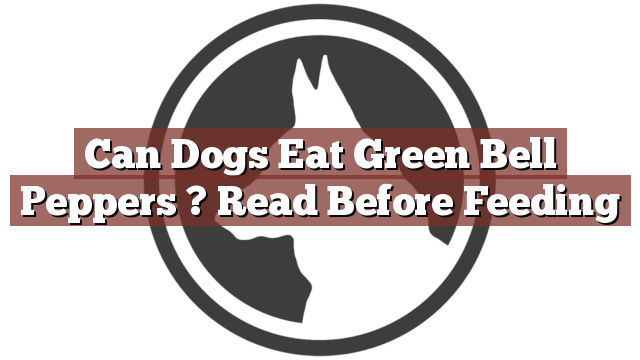Understanding Your Dog’s Dietary Needs
As a responsible dog owner, it is crucial to understand your furry friend’s dietary needs. While dogs are omnivores and can eat a variety of foods, not all human foods are safe for them. Some foods can even be toxic and harmful to dogs. It’s essential to do your research before introducing any new food into your dog’s diet. This article focuses on green bell peppers and whether they are safe for your canine companion.
Can Dogs Eat Green Bell Peppers? Read Before Feeding
Can dogs eat green bell peppers? The answer is yes. Green bell peppers are safe for dogs to eat in moderation. They are low in calories, fat-free, and packed with vitamins A, C, and E. These vitamins promote a healthy immune system, improve vision, and support overall well-being. However, while green bell peppers are generally safe, it’s important to consider a few factors before adding them to your dog’s meals.
Pros and Cons of Feeding Green Bell Peppers to Dogs
Feeding green bell peppers to your dog has its pros and cons. Let’s start with the benefits. Besides being a great source of vitamins, green bell peppers also contain fiber, which aids in digestion and can prevent constipation. The crunchy texture of bell peppers can also help clean your dog’s teeth and promote oral health. Additionally, these peppers are low in calories, making them a healthy treat option, especially for overweight dogs or those on a weight management plan.
However, it’s essential to be aware of the potential downsides. Bell peppers belong to the nightshade family, and some dogs may have sensitivities or allergies to this group of vegetables. If your dog has never eaten bell peppers before, it’s recommended to introduce them in small amounts and monitor for any adverse reactions such as vomiting, diarrhea, or stomach discomfort. It’s also advisable to remove the seeds and core of the pepper, as they can be difficult for dogs to digest.
Conclusion: Make an Informed Decision for Your Dog’s Health
In conclusion, green bell peppers can be a healthy addition to your dog’s diet when given in moderation. They provide essential vitamins, fiber, and a crunchy texture that promotes dental health. However, every dog is unique, and some may have sensitivities or allergies, so it’s important to introduce new foods gradually and watch for any adverse reactions. If you have any concerns about your dog’s diet or health, it is always best to consult with your veterinarian, who can provide personalized advice based on your dog’s specific needs.
Thank you for taking the time to read through our exploration of [page_title]. As every dog lover knows, our furry friends have unique dietary needs and responses, often varying from one canine to another. This is why it's paramount to approach any changes in their diet with caution and knowledge.
Before introducing any new treats or making alterations to your dog's diet based on our insights, it's crucial to consult with a veterinarian about [page_title]. Their expertise ensures that the choices you make are well-suited to your particular pet's health and well-being.
Even seemingly harmless foods can sometimes lead to allergic reactions or digestive issues, which is why monitoring your dog after introducing any new food item is essential.
The content provided here on [page_title] is crafted with care, thorough research, and a genuine love for dogs. Nevertheless, it serves as a general guideline and should not be considered a substitute for professional veterinary advice.
Always prioritize the expert insights of your veterinarian, and remember that the health and happiness of your furry companion come first.
May your journey with your pet continue to be filled with joy, love, and safe culinary adventures. Happy reading, and even happier snacking for your canine friend!

